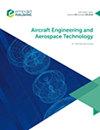Simultaneous arm morphing quadcopter and autonomous flight system design
IF 1.3
4区 工程技术
Q3 ENGINEERING, AEROSPACE
引用次数: 0
Abstract
Purpose The purpose of this paper is to obtain values that stabilize the lateral and longitudinal flight of the quadrotor for which the morphing amount and the best Proportional-Integral-Derivative (PID) coefficients are determined by using the simultaneous perturbation stochastic approximation (SPSA) optimization algorithm. Design/methodology/approach Quadrotor consists of body and arms; there are propellers at the ends of the arms to take off and rotors that rotate them. By reducing the angle between mechanism 1 and the rotors with the horizontal plane, the angle between mechanism 2 and the arms, the rotors rise and different configurations are obtained. Conventional multi-rotor aircraft has a fixed fuselage and does not need a tail rotor to change course as helicopters do. The translational and rotational movements are provided by the rotation of the rotors of the aircraft at different speeds by creating moments about the geometric center in 6-degree-of-freedom (DOF) space. These commands sent from the ground are provided by the flight control board in the aircraft. The longitudinal and lateral flight stability and properties of different configurations evaluated by dynamic analysis and simulations in 6 DOF spaces are investigated. An algorithm and PID controller are being developed using SPSA to achieve in-flight position and attitude control of an active deformable aircraft. The results are compared with the results of the literature review and the results of the previous article. Findings With SPSA, the best PID coefficients were obtained in case of morphing. Research limitations/implications The effects of quadrotor arm height and hub angle changes affect flight stability. With the SPSA optimization method presented in this study, the attitude is quickly stabilized. Practical implications With the optimization method, the most suitable PID coefficients and angle values for the lateral and longitudinal flight stability of the quadrotor are obtained. Social implications The transition rate and PID coefficients are determined by using the optimization method, which is advantageous in terms of cost and practicality. Originality/value With the proposed method, the aircraft can change shape to adapt to different environments, and the parameters required for more stable flight for each situation will be calculated, and this will be obtained more quickly and safely with the SPSA optimization method.同步臂变形四轴飞行器与自主飞行系统设计
目的利用同步摄动随机逼近(SPSA)优化算法确定四旋翼飞行器的变形量和最佳比例-积分-导数(PID)系数,求得四旋翼飞行器横向和纵向飞行的稳定值。设计/方法/方法四旋翼包括身体和手臂;在手臂的末端有螺旋桨可以起飞,还有旋翼可以旋转它们。通过减小机构1与转子与水平面的夹角,得到机构2与臂的夹角、转子的上升和不同的构型。传统的多旋翼飞机采用固定机身,不像直升机那样需要尾桨来改变航线。平移和旋转运动是由飞机的旋翼以不同的速度旋转,通过在6自由度(DOF)空间中产生关于几何中心的力矩来提供的。这些从地面发出的指令是由飞机上的飞行控制板提供的。通过动力学分析和仿真,研究了不同构型在6自由度空间下的纵向和横向飞行稳定性及性能。利用SPSA设计了一种算法和PID控制器,实现了主动变形飞行器的飞行位置和姿态控制。将所得结果与文献综述的结果和前一篇文章的结果进行比较。结果SPSA在变形情况下可获得最佳的PID系数。研究局限性/启示四旋翼机臂高和轮毂角变化对飞行稳定性的影响。采用本研究提出的SPSA优化方法,可以快速稳定姿态。应用该优化方法,得到了最适合四旋翼飞行器横向和纵向飞行稳定性的PID系数和角度值。采用优化方法确定过渡率和PID系数,在成本和实用性方面具有优势。利用本文提出的方法,飞机可以改变形状以适应不同的环境,并计算每种情况下更稳定飞行所需的参数,使用SPSA优化方法可以更快、更安全地获得这些参数。
本文章由计算机程序翻译,如有差异,请以英文原文为准。
求助全文
约1分钟内获得全文
求助全文
来源期刊
CiteScore
3.20
自引率
13.30%
发文量
168
审稿时长
8 months
期刊介绍:
Aircraft Engineering and Aerospace Technology provides a broad coverage of the materials and techniques employed in the aircraft and aerospace industry. Its international perspectives allow readers to keep up to date with current thinking and developments in critical areas such as coping with increasingly overcrowded airways, the development of new materials, recent breakthroughs in navigation technology - and more.

 求助内容:
求助内容: 应助结果提醒方式:
应助结果提醒方式:


